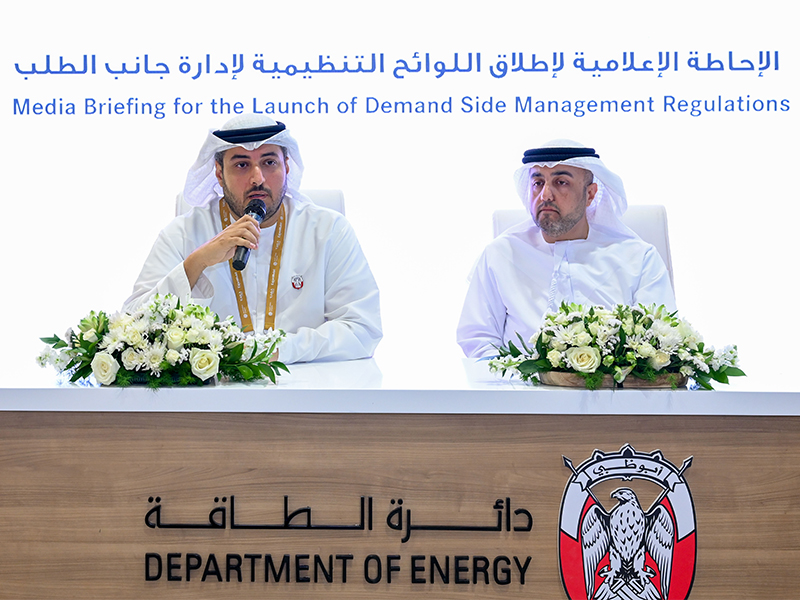
In accordance with its mandate for issuing and implementing policies, laws and regulations that regulate the energy sector, the Abu Dhabi Department of Energy (DoE) continues its efforts, during the Year of Sustainability 2023, to accelerate the implementation of policies and regulations that support the Abu Dhabi vision, the UAE Net Zero 2050 Strategic Initiative, and related strategies that aim to promote the sustainability of the energy sector.
DoE has announced today that it aims to implement its Demand Side Management Regulations from 1st July 2023. These Regulations form a comprehensive framework for designing, implementing, and evaluating energy and water efficiency initiatives related to demand side management. They aim to achieve bigger energy and water savings, load distribution, reduction in greenhouse gas emissions, peak reduction, reduction in government subsidy to customer electricity and water bills, while simultaneously enhancing customers' comfort, health, and safety.
DOE continues to update and expand the Abu Dhabi Demand Side Management and Energy Rationalization Strategy (DSM) 2030. The strategy aims to balance supply and demand in the energy sector to secure significant economic and environmental gains, ensure the stability of the energy demand ecosystem, and the sustainability of its sources in the Emirate.
The new Regulations will also support supply side future plans and projects by postponing or avoiding the need for investments in generation, transmission, and distribution infrastructure, in addition to reducing losses in the transmission and distribution network.
As part of the planning phase, DoE will issue the DSM Plan Guidelines every year. These guidelines will highlight the key focus areas and priorities that need to be captured by relevant stockholders who shall develop and submit their DSM Plan to DoE for approval.
The DSM Plan would describe each DSM Initiative and expected annual saving to be achieved. The DoE will evaluate and approve DSM plans based on cost-benefit analysis on an annual basis, with clear calculations demonstrating the effectiveness of the initiatives.
H.E. Eng. Ahmed Mohammed Al Rumaithi, Undersecretary, Abu Dhabi Department of Energy said: “The Abu Dhabi DSM Strategy 2030 showcases the Emirate's continuous efforts to lead the transformation towards a secure, reliable, and sustainable energy system in line with the UAE Net Zero by 2050 strategic initiative and the National DSM Programme. The strategy focuses on cost-effective solutions to enhance energy security, reduce the energy supply and demand gap, and mitigate climate change impacts while promoting sustainable economic development. The implementation of the DSM Regulations will not only incur benefits to our industry but also to customers by improving health and convenience and ensure the preservation of our resources.”
Abu Dhabi's energy demand is projected to increase steadily over the next decade, with consumption rates expected to increase by 1.4 per cent each year until 2035. In this scenario, energy efficiency and rationalization are critical solutions to address energy and climate change concerns. Latest forecasts from the Emirates Water and Electricity Company indicate that the demand for energy in Abu Dhabi will continue to grow rapidly until 2030, with an average growth rate of 5.4% annually. This is primarily due to the expected increase in the base load for the requirements of the manufacturing sector, which makes energy efficiency and rationalisation among the necessary solutions to address challenges related to energy security and climate change.
Eng. Ahmed Juma Al Falasi, Acting Executive Director of Energy Efficiency at DoE, said: “The new DSM regulations provide an integrated approach that links all elements into a coherent energy efficiency program, ensuring a safe, reliable, and sustainable system for the future.” Al Rumaithi pointed out that DoE works to enhance infrastructure and empower Abu Dhabi to excel on a global scale. “We are committed to contributing actively to the Abu Dhabi Demand-Side and Energy Rationalization Strategy 2030 with a bundle of regulatory enablers and supporting tools to help program owners meet their statutory requirements.”
DoE has worked diligently to address the challenges arising from urban development, especially those related to energy and water consumption. The DSM strategy has so far helped in reducing 3.3 million metric tons of carbon emissions, which is equivalent to an economic benefit equivalent to AED 1.1 billion, as well as saving up to 6,500 GWh of electricity and 234 million cubic meters of water.
The DSM Regulations support government objectives under the Abu Dhabi Demand Side Management and Energy Rationalization Strategy 2030, which was unveiled in 2019 to provide economic and environmental benefits in line with Abu Dhabi Vision and UAE national strategies. The strategy aims to address supply and demand issues through a nine-program multi-stakeholder approach that has a potential to reduce electricity consumption by 22 per cent and water consumption by 32 per cent by 2030, from the 2013 baseline. These programs include Building Retrofits, Demand Response, Efficient Water Use/ Re-use, Building Regulations, Street Lighting, District Cooling, Standards & Labels, Energy Storage, and Rebates & Behavioural Change.
